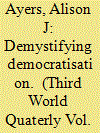|
|
|
Sort Order |
|
|
|
Items / Page
|
|
|
|
|
|
|
| Srl | Item |
| 1 |
ID:
069174


|
|
|
| 2 |
ID:
117024


|
|
|
|
|
| Publication |
2012.
|
| Summary/Abstract |
Since the 1990s, the notion of the 'failed state' has become a core organising concept in international, security and development idiom and practice. Although initially developed by policy networks, the proliferation of academic literature on 'failed states' accepts largely uncritically the accounts of foreign-policy makers, taking the notion of state failure entirely as given, as an unproblematic descriptive and analytical term. This article rejects such accounts, arguing that the concept of the 'failed state' remains essentially contested and under-theorised. In particular, the term immediately embodies a set of assumptions that obfuscate any serious understanding of the causes of social conflict and crisis. The article interrogates the concept of the 'failed state', the assumptions from which the thesis of 'state failure' is derived, its ideological character and integral relation to the history and current order of imperialism. The article does not refute the prevalence of social crises; rather, it contends that the notion of the 'failed state' is descriptively weak and analytically inadequate in furthering an understanding of the causes and conditions of such crises. Moving beyond critique, the article outlines a more adequate methodological, theoretical and substantive approach to analysis and explanation of social crises, centring on the structures and practices of imperialism.
|
|
|
|
|
|
|
|
|
|
|
|
|
|
|
|
| 3 |
ID:
123527


|
|
|
|
|
| Publication |
2013.
|
| Summary/Abstract |
This article analyses the widely reported increase of unfree labour in Africa through neoliberalism, arguing that, far from an individual relationship of domination epiphenomenal to global political-economic restructuring, unfree labour must be understood as a social relationship of insecurity and exploitation whose acceleration in recent decades is traceable to broader shifts in the relations of production and social reproduction. These include the impact of labour market reform and privatisation on wages, employment and poverty; the rise of informalisation, including the marketisation of social reproduction; Africa in the international division of labour and labour conditions in global supply chains; and the rise of brics, the 'new scramble' for African resources and markets, and intensified processes of primitive accumulation. In a continent beleaguered by the slave trade and the systematic, widespread and brutal exploitation of forced labour during the colonial era, concerns around labour conditions of violence, bondage and coercion are particularly acute. Understanding the complexities of labour unfreedom in Africa today requires an understanding of the various forms and layers of coercion, immobility and exploitation fundamental to the contemporary social structures of capitalist accumulation, overcoming the binary typically posited between free and unfree labour.
|
|
|
|
|
|
|
|
|
|
|
|
|
|
|
|
|
|
|
|
|